2 Apr 2019 | Awards, Egypt, Fellowship, Fellowship 2018, Middle East and North Africa, News
[vc_row][vc_column][vc_column_text]
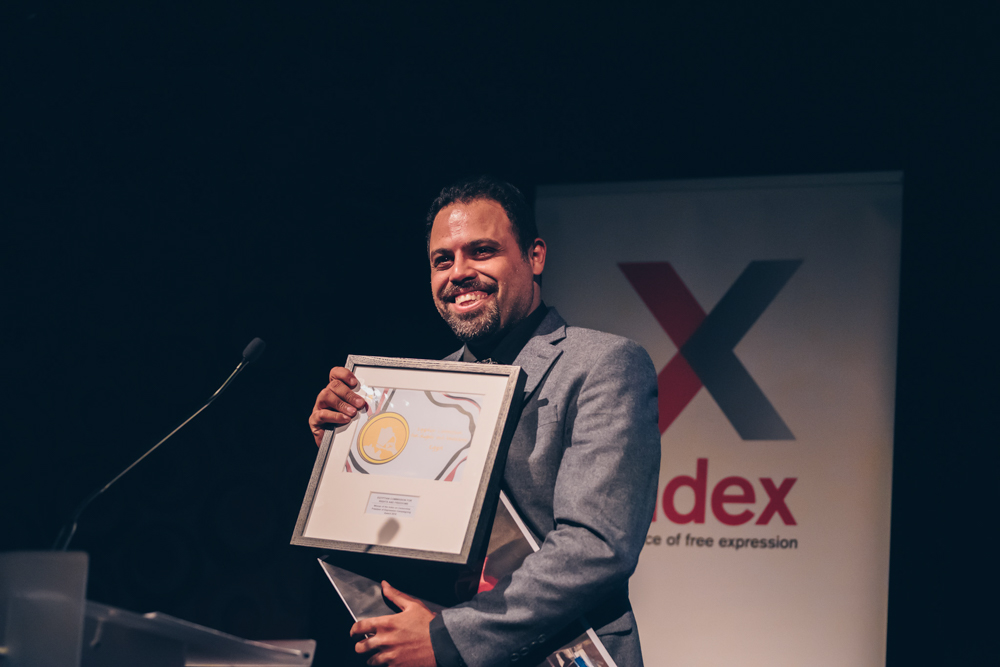
Ahmad Abdallah of Campaigning Award-winning Egyptian Commission for Rights and Freedoms at the 2018 Index on Censorship Freedom of Expression Awards (Photo: Elina Kansikas)
The Egyptian government has waged an organised campaign against independent civil society groups and has become increasingly hostile to dissent. The Egyptian Commission for Rights and Freedoms, winner of the 2018 Index on Censorship Freedom of Expression Award for Campaigning, is one of the few human rights organisations still operating in the country. ECRF continues to provide advocacy, legal support and campaign co-ordination, drawing attention to the many ongoing human rights abuses under the autocratic rule of Egypt’s president, Abdel Fattah el-Sisi. Their work has seen them subject to state harassment, with their headquarters being raided and staff members arrested. Regardless of the challenges and threats they face, the organisation is committed to continuing their work.
The May 2018 arrest of Amal Fathy, activist and wife of Mohamed Lotfy, executive director of ECRF, for a Facebook post she made discussing her experience with sexual harassment, has been a major challenge for the organisation. Fathy was released from prison, but a two-year prison sentence still hangs over her, which can be enforced at any time by a court. This sentence has had a significant impact on Fathy and her husband, but the fight for her freedom continues.
“She had huge depression problems when she was in jail, so she’s trying to seek some medical assistance, but still having a verdict that can be implemented any time is very bad for her,” aid Ahmad Abdallah, head of ECRF’s board of trustees.
“Everyone in ECRF believes in freedom and freedom doesn’t come without a price, so everyone is willing to pay that price,” Abdallah added. “We believe in human rights for all Egyptians and we know that this is very precious.”
ECRF continues to expand itself, as they now have three offices outside of Cairo and help from 13 of the 27 governorates, the top-level of public administration, in Egypt.
“Every government in Egypt has different problems than other ones,” said Abdallah. “We don’t have a centralised approach, but rather a decentralised approach and this goes with our mission and vision because we help local human rights defenders; we help them to help themselves and their communities.”
ECRF has been able to help communities in the Aswan governorate, where ECRF has helped them with keeping migrants safe and supported. In the Delta region, which has a serious issue with Gaucher disease, an inherited disorder where a type of fat called glucocerebroside cannot be adequately degraded, ECRF has provided people with legal assistance in their fight to get the government to provide them with medication.
As they expand throughout Egypt, ECRF will continue to develop its capacity to monitor human rights violations. They develop this by training all of the people who approach them wanting to learn how to document violations in their local communities. “We host a lot of training for these human rights activists to give them the technical knowledge on not just how to document violations, but also how to lobby for this, and we provide them with legal assistance whenever needed,” said Abdallah.
A report by Human Rights First looks at how the treatment of prisoners in Egypt, who are often locked up for voicing their political opinions, has led to a drive in recruitment for the Islamic State. Abdallah, who himself was imprisoned and witnessed the radicalisation that often occurs, calls the prisons “terrorist-making machines”. “A lot of the time prisoners are forced to join Isis to take some benefits because they are the most organised body inside prison and a lot of the prisoners, they have nothing, so sometimes people in Isis provide them with food, and provide them with protection in prison,” he said.
ECRF has made their main priority in 2019 to challenge the death penalty, which has already been enforced at least 15 times since the start of the year, with around 50 people at risk of execution at any moment.
“With any other charge, people can have another chance for life, but with execution it’s already over,” said Abdallah. “So this year we are planning to lobby more against the capital punishment in Egypt and we hope that this will be successful,”
For ECRF, being an Index fellow has given them much recognition, which has been hugely important in opening the door to work with other big organisations such as Ushahidi, a technology company they are planning on working with, Abdallah added. “Being an Index fellow has put us on the map as a big organisation that has won such a respected prize. Mostly it helped us to crystallise our vision, and this is the biggest success that we have achieved.”[/vc_column_text][/vc_column][/vc_row][vc_row][vc_column][vc_basic_grid post_type=”post” max_items=”4″ element_width=”6″ grid_id=”vc_gid:1554194959898-530a4dcb-1737-5″ taxonomies=”24136, 25926″][/vc_column][/vc_row]
9 Jan 2019 | Awards, Awards Update, Egypt, Fellowship, Fellowship 2018, Middle East and North Africa, News
[vc_row][vc_column][vc_column_text]

Ahmad Abdallah of Campaigning Award-winning Egyptian Commission for Rights and Freedoms at the 2018 Index on Censorship Freedom of Expression Awards (Photo: Elina Kansikas)
The Egyptian Commission for Rights and Freedoms, winner of the 2018 Index on Censorship Freedom of Expression Award for Campaigning, is one of the few remaining human rights organisations in Egypt, a country that often uses its struggle against terrorism as a justification for its crackdown on human rights. What’s more, in 2018 the group expanded its reach, opening new offices around the country, continuing to highlight human rights abuses and providing support for those facing repression.
In May 2018, Amal Fathy, wife of Mohamed Lotfy, executive director of ECRF, was arrested and charged with “spreading fake news” after posting a video in which she criticised the government and recounted her experiences of sexual harassment on the streets. She was later also charged with “belonging to a terrorist group”, for reasons that have yet to become clear. In late December 2018, Fathy was released, although remains under house arrest. Days later an Egyptian court upheld a two-year prison sentence against the activist, raising fears she could again end up behind bars.
Despite the difficulties it faces, it’s “business as usual” for the group and its work. Index spoke with three ECRF co-founders, Ahmad Abdallah, head of the board of trustees, Lotfy and Mohamed Sameh, international relations advisor to talk about these issues.
How is Amal doing and what has life been like since her release?
Mohamed Lotfy: There are ups and downs at the moment. Of course, she is very happy to be free, finally. However, she is anxious after the two-year verdict issued on the 30 December. We live day by day and we don’t know what might happen.
Ahmad Abdallah: Amal is very tired, she still needs medication. She used to have depression problem and it deteriorated while she was in jail. She has had a horrible experience. With her two year sentence, she can be picked up anytime. She was released on probation and is not allowed to leave the house. She goes to the police station every week. The two-year sentence was harsh and she can be taken any time. She is not well yet, she still needs medical care.
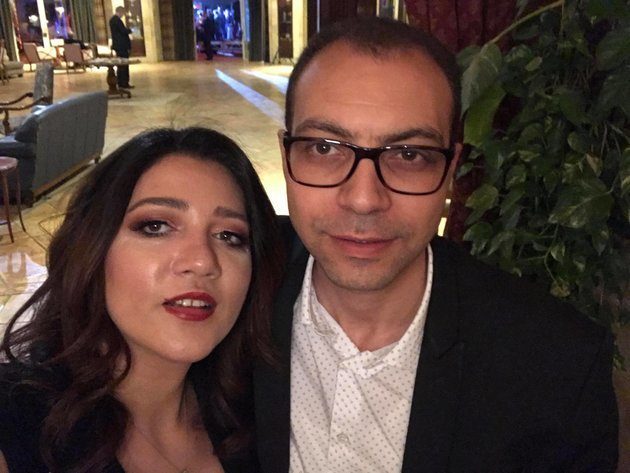
Mohamed Lotfy (right) with his wife, the imprisoned activist Amal Fathy
What does it mean to have Amal home?
Lotfy: It means a lot. It means that our family is reunited. The boy can stay with his mother and father in the same place after spending almost eight months without the two of us. I was visiting my family or her family where he was staying but now, for the first time in eight months, he can see his father and mother every day at home. It’s a big change for him, for her and for me as well. It’s a feeling of home.
Abdallah: It was very good to see them together once again. It was very good for her son to see her. We expected that we could start her treatment but, unfortunately, a couple of days later she took a very harsh sentence. We are all disappointed and sad. Amal is a good person — she shouldn’t be in jail.
Lotfy: I made an official request to the National Council for Human Rights asking for a presidential pardon after the court gave Amal two years prison. The ruling is a very negative message to send to Egyptian women, to say that a victim of sexual harassment could be imprisoned for calling out this plague while harassers remain free. There is a whole social and political dimension to this. If Amal is imprisoned women will be discouraged from taking any legal steps or speaking out against sexual harassment and this is highly problematic. This can be dealt with a presidential pardon.
People continue to be arrested in Egypt, from academics and lawyers to journalists and activists. How do you view the current situation in the country and do you see any signs of hope for improvement?
Lotfy: The image is very bleak. We’ve seen no progress in the last year. We hoped that there would be less crushing of the dissident and fewer arrests against dissidents after the presidential elections. However, these arrests continued and disappearances and torture have continued. The same record on human rights continued throughout 2018. But as long as there are people who are trying to make things better and defending human rights in Egypt, then there is hope.
Abdallah: The situation in the country is disastrous, but I believe in the Egyptians and I believe in the youth. They are the light at the end of the tunnel.
What was it like for Mohamed Sameh to meet with fellow Index award winners the Cuban Museum of Dissidence when he was in London? What struggles and hopes do you think you both share for your home countries?
Mohamed Sameh: It was great to meet with the fellow Index award winners the Museum of Dissidence in London. We share many views and very similar challenges and it was wonderful such a connection across the Atlantic. Building bonds of trust is essential not only for our work, but also showing us in practice that we are not alone in our struggle. It helps putting the challenges we face in perspective. When we heard of their arrest in December, they were no longer only names, but friends who needed our support. We are happy and proud that we stand together.
ECRF recently opened two new offices in Egypt, in Aswan and Mansoura. Why were new offices necessary and how will it allow you to realise the aim of becoming more digital and ensuring the safety of both yourselves and those you work with?
Lotfy: One of the critiques of human rights organisations is that they are very centralised in Cairo and don’t reach out enough to the population outside of the capital. This is very true, so we are trying to deal with this weakness by investing more time and resources and personnel elsewhere in areas that have needs that are a bit different. Cairo being a big city has mainly civil and political rights needs, while other areas have more human rights issues that have to do with health, economic rights, environment, labour rights and so on. We have to be able to care about the main civil and political rights that we find a lot in Cairo and the specific needs of areas in Egypt like Aswan and Mansoura.
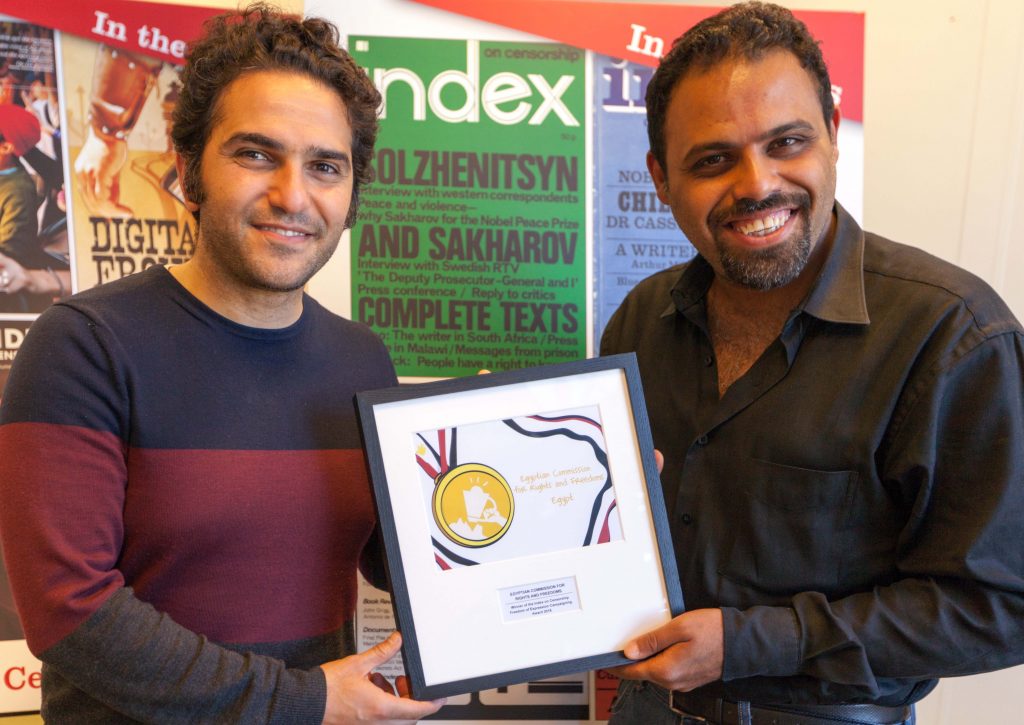
Human rights defenders Mohamed Sameh and Ahmad Abdallah of 2018 Freedom of Expression Campaigning Award-winning Egypt Commission on Rights and Freedoms. (Photo: Index on Censorship)
What does the Index on Censorship Fellowship mean to ECRF?
Lotfy: The fellowship from Index on Censorship has been very useful in opening our channels of communication with technology experts, with capacity building for staff members and senior members of management. But also, in the case of Amal, specifically, I was astonished by the amount of interest that Index has shown to the case of my wife either through publicity, lobbying but also through the complaints made to the UN. These were outputs and help that I did not expect and found very useful and freed my wife as well.
When members of our team travelled to Berlin for training in digital technologies, they exchanged ideas ideas about preparing the ground for the future of our human rights work and for the future generation of human rights activists that is more engaging, technology-oriented, secure and allows for a much bigger outreach of people interested in human rights.
Abdallah: The fellowship has really given us huge opportunities to improve and to progress in our work. It has opened new doors, especially in the use of technology in human rights.
Sameh: The Index award has been of utmost importance to us. It introduced us to a new terrain of co-operation and perspective. The dynamic it has created within our team has been vital for many of the steps we have undertaken since April 2018.
What lays ahead in 2019 for ECRF?
Lotfy: We continue to do our work. Business as usual. Every day we are still around and able to fight for human rights is a victory in the difficult circumstances we work in.[/vc_column_text][/vc_column][/vc_row][vc_row][vc_column][vc_basic_grid post_type=”post” max_items=”4″ element_width=”6″ grid_id=”vc_gid:1547050462858-06f4b172-7d5e-7″ taxonomies=”24136″][/vc_column][/vc_row]
23 Nov 2018 | Campaigns -- Featured, Statements
[vc_row][vc_column][vc_column_text]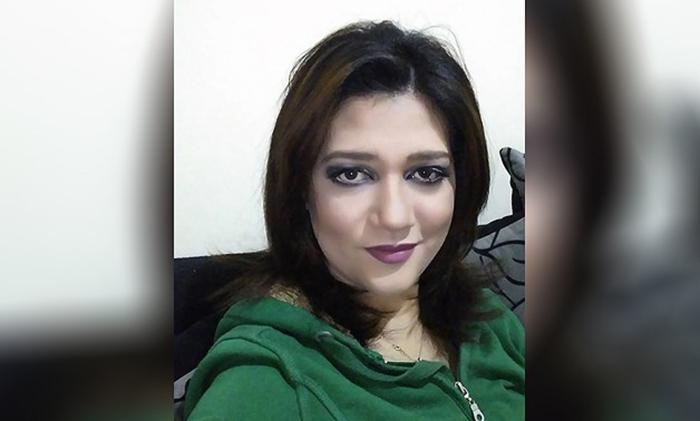
Index on Censorship and international human rights lawyers at Doughty Street Chambers condemn the continued detention of Amal Fathy – an Egyptian activist who made a video about her experience of sexual harassment.
Fathy was arrested on 9 May 2018 and has spent 200 days in detention on charges of “spreading fake news”. On 29 September she was given a suspended sentence of two years in prison on these charges with a £430 fine. Although Fathy was granted release on bail she remains in detention over further charges of “belonging to a terrorist group”, “using a website to promote ideas calling for terrorist acts”, and “intentionally disseminating false news that could harm public security and interest”.
She will appear in court on these charges on Sunday 25 November 2018.
“It is appalling that Amal Fathy remains in detention. Her ‘crime’ has been to speak out publicly about the sexual abuse faced by so many women in Egypt and she should be released immediately,” said Index on Censorship CEO Jodie Ginsberg.
Caoilfhionn Gallagher QC of Doughty Street Chambers said: “Amal Fathy has now been detained arbitrarily for 200 days, in unsanitary and unsafe conditions, without meaningful access to her lawyers, and away from her family and young son. She spoke out about the rights of women; now the Egyptian authorities are silencing her by holding her in prison for months on end, with no proper legal basis. The international community must now condemn Egypt’s flagrant breaches of her basic rights to liberty, due process and dignity.”
Fathy was initially arrested with her husband Mohamed Lotfy, and their two-year-old son. Their Cairo apartment was raided and searched. Lotfy, who leads the Index on Censorship Freedom of Expression Award-winning Egyptian Commission for Rights and Freedoms, which coordinates campaigns for those who have been tortured or disappeared, was later released.
Speaking ahead of Sunday’s hearing, Lotfy said: “The crackdown by the authorities on political dissidents and critical voices in Egypt spreads fear among society and violates the basic rights of freedom of expression. The authorities stick the label of ‘terrorist’ to those who peacefully express critical opinion regardless of the topic — political, social, economic, religious, or even on sport — using anti-terrorism legislation to prosecute and detain holders of such opinions. Not only this is a violation of the right to freedom of expression, but it is also counter-productive in the fight against terrorism. Amal Fathy is a blatant example of this confusion. She is a kind, peaceful and loving person, who suffered from sexual harassment and spoke out against it. She found herself accused of terrorism and detained now for six months.”
After months of pre-trial detention, Fathy’s first court hearing was on 11 August.
Fathy suffers from mental ill health, which has been severely exacerbated by her detention.
On 23 May 2018 Doughty Street Chambers — along with ECRF and Index on Censorship — lodged a complaint with the United Nations Special Rapporteurs on freedom of expression and the protection of human rights defenders on behalf of Fathy and her family. The organisations asked the two Special Rapporteurs to:
- gather, request, receive and exchange information and communications from the Egyptian Government in relation to this case;
- publicly make concrete recommendations to the Egyptian authorities on their duty to adhere to their international obligations; and
- issue an opinion finding that Egypt has failed to adhere to its own obligations, and violated the rights of the complainants, under international law.
On 24 July 2018 an appeal against Egypt was lodged by Doughty Street Chambers, jointly with ECRF and Index on Censorship, with another UN body, the Working Group on Arbitrary Detention. They have complained about Amal Fathy’s detention and called on the Working Group to issue a finding that her detention is arbitrary and in violation of Egypt’s obligations under international law, and to call for her immediate release, and to ask Egypt to investigate her unlawful detention and to award her compensation. The Working Group is considering the appeal.
Update: Amal Fathy’s trial has been postponed to 30 December.[/vc_column_text][/vc_column][/vc_row][vc_row][vc_column][vc_basic_grid post_type=”post” max_items=”4″ element_width=”6″ grid_id=”vc_gid:1543231190492-716c3068-6e3a-2″ taxonomies=”25926″][/vc_column][/vc_row]
22 Nov 2018 | Awards, Fellowship, Fellowship 2018, News
[vc_row][vc_column][vc_column_text]
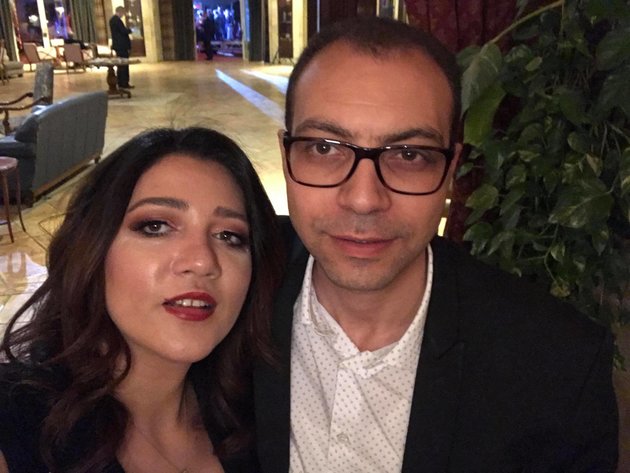
Mohamed Lotfy (right) with his wife, the imprisoned activist Amal Fathy
Mohamed Lotfy, executive director of the Egyptian Commission for Rights and Freedoms, the organisation that won the 2018 Index on Censorship Freedom of Expression Award for Campaigning, has been awarded the Franco-German Prize for Human Rights and the Rule of Law, which is given each year to those who have made outstanding contributions to the protection and promotion of human rights and the rule of law.
“Index on Censorship is very happy to see Mohamed Lotfy’s outstanding work recognised in this way,” said Perla Hinojosa, fellowships and advocacy officer at Index. “We hope this award will help in highlighting injustices occurring in Egypt and the important and much-needed work ECRF does in defending and protecting human rights.”
The announcement was made by Jean-Yves Le Drian, the French minister of Europe and Foreign Affairs, and his German counterpart, Heiko Maas, on 21 November. Lotfy is one of 15 human rights defenders who will receive the award. The official ceremony will be on Human Rights Day on 10 December 2018.
The news comes one day after Lofty marked his four-year wedding anniversary with his wife Amal Fathy, who has been detained since May after posting a video criticising sexual harassment in Egypt.[/vc_column_text][/vc_column][/vc_row][vc_row][vc_column][vc_basic_grid post_type=”post” max_items=”4″ element_width=”6″ grid_id=”vc_gid:1554195663833-6f93bcae-39d6-8″ taxonomies=”24136″][/vc_column][/vc_row]





